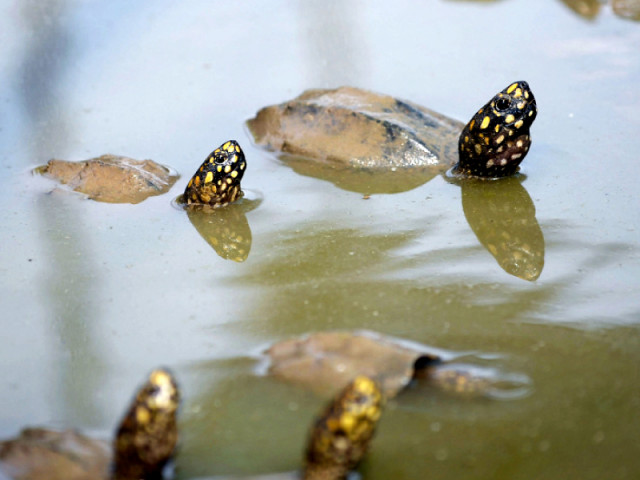Save the habitat: Sindh to observe World Wildlife Day today
The province's indigenous animals suffer from illegal trade and smuggling.

These black spotted turtles were recovered from smugglers in September 2014. PHOTO: FILE
The Sindh Wildlife department is observing World Wildlife Day today (March 3) and is conducting a survey on the Indus Dolphin. Referring to a recent message of the Secretary General of the United Nations Ban Ki-moon, provincial conservator Javed Ahmed Mahar said the focus of his department is on halting wildlife trafficking. "It's an international issue and we are serious in making effective legislation to prevent this," he said.
Animal smugglers are very active in Sindh, especially in transporting fresh water turtles, despite the provincial government's recent bans. "We have maintained a check over this particular trade for the last couple of months and won't let anyone go easily," claimed Mahar.
Sources informed The Express Tribune that turtle smugglers are adopting different kinds of methods to transport these endangered species. "There is huge money involved in this business," said an official.
Not only fresh water turtles but the illegal trade of the houbara bustard, falcons and cranes and other protected animals and birds goes through Sindh from other parts of the country and outside Pakistan.
"All species are important and we have to conserve all kinds of indigenous animals," briefed Mahar, saying the day is being celebrated so that awareness of wildlife can be spread to the general masses. "We have to sensitise people and officials, especially law enforcing agencies."
Ki-moon in his message said: "Illegal trade in wildlife has become a sophisticated transnational form of crime, comparable to other pernicious examples, such as trafficking of drugs, humans, counterfeit items and oil. It is driven by rising demand, and is often facilitated by corruption and weak governance. There is strong evidence of the increased involvement of organised crime networks and non-state armed groups."
The officials informed that the provincial authorities have never given due importance to the wildlife department. "It lacks resources and the officials have been influenced by politicians," an official said under the condition of anonymity. "Unfortunately, the wildlife department doesn't have experts — it completely lacks human resources. This shows how much attention has been given to the department in the past."
Published in The Express Tribune, March 3rd, 2015.



















COMMENTS
Comments are moderated and generally will be posted if they are on-topic and not abusive.
For more information, please see our Comments FAQ